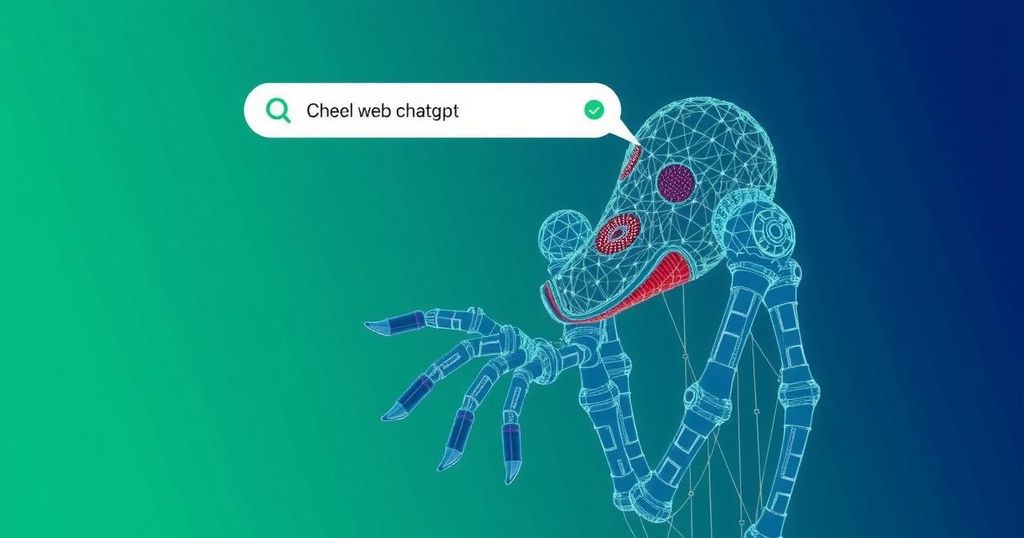OpenAI has enhanced ChatGPT by equipping it with web browsing capabilities to provide real-time information, posing a significant challenge to Google. This feature will be accessible to paying users and aims to improve the accuracy of responses while addressing concerns in the digital publishing landscape. As AI continues to evolve, traditional information sources may face disruptions, prompting discussions surrounding copyright and revenue models.
OpenAI has announced a transformative upgrade to ChatGPT, enabling the chatbot to search the web and provide real-time information. This development positions ChatGPT as a formidable competitor to Google, offering users a novel method for information retrieval online. From Thursday, this feature will be accessible to paying subscribers, enhancing the chatbot’s capabilities beyond its static training data. Utilizing Microsoft’s Bing engine, ChatGPT’s search feature will allow it to summarize and respond to inquiries using current internet information. OpenAI’s strategic partnerships with respected publishers such as News Corp and the Associated Press augment its content resources, moving ChatGPT closer to behaving like a conventional search engine. In response to rising competition from AI-driven search tools, Google has incorporated AI-generated summaries into its searches, complete with source citations. Startups such as Perplexity have gained considerable traction, attracting over $400 million in investment according to PitchBook, illustrating significant interest in AI-enhanced search functionalities. Varun Shetty, head of media partnerships at OpenAI, emphasized the new feature’s enhancement of accuracy, stating, “We think it improves relevancy and decreases hallucinations, because of the ability to go out to the web.” This feature aims to furnish users with more credible answers than before, highlighting the increasing importance of accuracy in AI responses. As AI search models gain traction, the digital publishing sector faces potential disruptions. Traditionally, Google has driven traffic to publishers and enabled monetization through advertisements and subscriptions. However, AI’s direct responses challenge this model by providing immediate answers without directing users to external sources, raising concerns among publishers about diminished traffic and revenue. Some publishers allege that AI-driven tools exploit their content without proper compensation, leading to lawsuits against OpenAI for copyright violations. OpenAI’s recent updates may redefine the relationship between AI search models and digital publishing. To address concerns, ChatGPT includes links to original sources alongside summaries, preserving content partner control over access and monetization strategies. According to Shetty, these summaries could encourage users to investigate publisher websites further, stating, “We think they’ll be curious and want to click off and learn more.” This suggests the potential for AI tools to drive additional traffic to content sources as users seek more in-depth understanding. The rapid growth of ChatGPT since its introduction in 2022 indicates that Google’s search dominance may be genuinely challenged as users increasingly access answers through AI tools. Google has responded by emphasizing AI-generated responses prominently in search results. Currently, Google reports over 1 billion users encountering AI-driven answers, while ChatGPT approaches 250 million weekly users, highlighting the significance of both platforms in the information landscape. As the US gears up for the upcoming presidential election, OpenAI seeks to mitigate misinformation risks by prioritizing credible sources for politically-inclined queries. Shetty noted, “What we’ve tried to do is prioritise and elevate the highest quality and authoritative sources we have,” aiming to ensure accurate dissemination of information during critical times.
The article discusses OpenAI’s latest advancements in ChatGPT, specifically its web browsing capabilities designed to provide real-time answers backed by current data. This shift occurs within a competitive landscape where traditional search engines like Google are adapting their strategies to incorporate AI advancements. The ongoing changes highlight the potential disruption to the digital publishing industry, where concerns about content use and monetization are becoming increasingly prevalent as AI tools emerge as direct information sources for users.
The launch of ChatGPT’s web search feature signifies a pivotal moment in the evolution of AI-driven information retrieval, positioning it as a substantial competitor to established search engines like Google. As AI continues to reshape how users access online information, traditional publishing faces challenges regarding revenue models and content rights. Nevertheless, OpenAI remains optimistic that its enhancements will ultimately benefit publishers by fostering user curiosity and traffic to original sources.
Original Source: www.business-standard.com

Leave a Reply